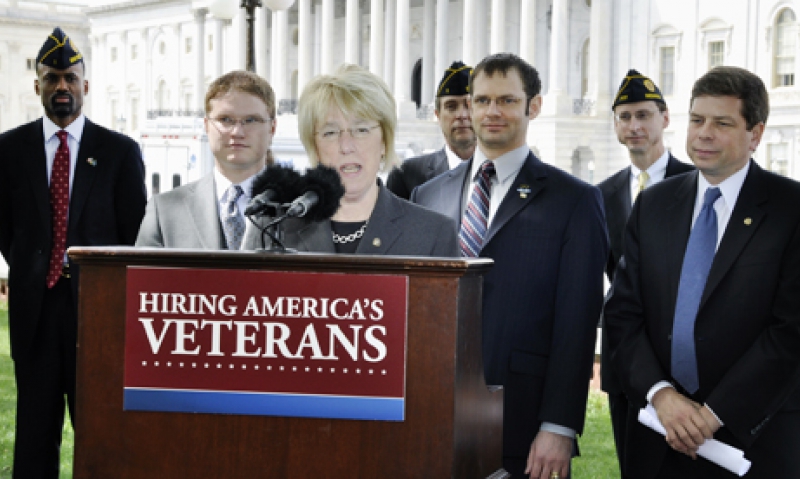
Yesterday, Sen. Patty Murray, D-Wash., introduced the Hiring Hero Act bill at a Washington press conference.
On May 11, Sen. Patty Murray, D-Wash., introduced the Hiring Heroes Act bill at a Washington press conference, emphasizing that veterans "have incredible skills" which "many employers are looking for today."
But those skills, Murray said, need to be translated into civilian resumes "that an employer can look at and understand - and that is the intent of this legislation," which, among other provisions, would make the military's Training Assistance Program (TAP) mandatory for all servicemembers leaving active duty.
"This legislation will go a long way toward meeting the transitional needs of America's heroes," said Peter Gaytan, executive director of The American Legion in Washington. "Many of our returning veterans have been struggling to find adequate employment at home, and passing a bill that provides them with job training to help them back into the work force is commendable."
Unemployment among veterans aged 20-24 stands at 27 percent and The American Legion has been working with Congress, the Department of Labor and other federal agencies to create better job opportunities for returning veterans and to enforce veterans preference guidelines.
Tim Tetz, legislative director of The American Legion, said the proposed legislation "is a well-crafted and comprehensive approach to veterans unemployment. It provides a mandate to make certain all of our veterans are trained before they leave active duty." Tetz also stated that other provisions in the bill would give veterans increased job opportunities, more unemployment and other benefits for those who need them.
The Legion has also been pushing licensing and certification authorities to recognize training and experience gained in the military. Murray's bill would require the DoD, the DoL and the VA to identify equivalencies between the skills of certain military occupation specialties (MOSs) with those of civilian jobs. The bill would also require the three agencies to eliminate barriers between military training and civilian licensure or credentialing for several MOSs.
"We've been asking Congress for help on this issue for quite some time now," said Joe Sharpe, The American Legion's economic director. "We're very impressed with Sen. Murray's legislation and believe it will go a long way in correcting problems that veterans face with civilian certification. If you've spent the last four years of your life repairing jet engines on helicopters, you shouldn't have to take ‘Engine Maintenance 101' just to get the same job with a civilian firm."
In July 2010, Sharpe told the House Veterans' Affairs Subcommittee on Economic Opportunity that "many servicemembers, certified as proficient in their military occupational careers, are not licensed or certified to perform the comparable job in the civilian workforce, thus hindering chances for immediate civilian employment and delaying career advancement."
While the DoD has TAP in place, Murray's office claims that about one-third of servicemembers leaving the military do not participate.
Overall, the bill would modify federal employment practices to encourage the hiring of returning veterans, and would require the Department of Labor to follow up with veterans to determine whether they are employed or might need further assistance.
- Legislative

